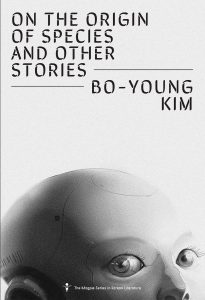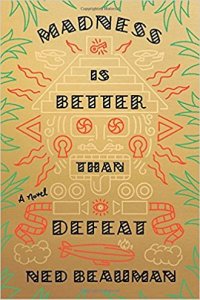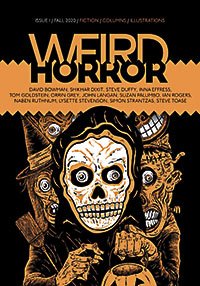Gary K. Wolfe Reviews On the Origin of Species and Other Stories by Bo-Young Kim
 On the Origin of Species and Other Stories, Bo-Young Kim (Kaya Press 978-1-885030-71-9, $19.95, 224pp, tp) May 2021.
On the Origin of Species and Other Stories, Bo-Young Kim (Kaya Press 978-1-885030-71-9, $19.95, 224pp, tp) May 2021.
When I reviewed Kim Bo-Young’s I’m Waiting for You and Other Stories last April, the first collection from an author widely regarded as among the most prominent voices in Korean science fiction and fantasy, I found it impressive, but also tantalizing: it consisted only of two pairs of linked stories, leaving me curious as to what the wider range of Kim’s fiction might look like. The seven stories and one short essay in On the Origin of Species and Other Stories (translated by Joungmin Lee Comfort & Sora Kim-Russell) go a long way toward providing an answer, though again the two longest tales are linked, suggesting that Kim may be intrigued by the idea of revisiting the same conceits to see what might be revealed by a different angle of approach. In a sense, that might also characterize her approach to SFF in general. Some of the themes may be familiar – a cryptic communication from a planet light-years away, robots in a posthuman world, a game-player reluctant to abandon the virtual environment – but Kim’s evident delight in exploring the implications of these ideas is contagious. In her brief introduction, she offers a clever and thoroughly original comparison between the science in SF and, of all things, a woman’s breasts: both are often seen as prominent, but not defining or essential characteristics, and neither are mere decoration.
The lead story, ‘‘Scripter’’, is set inside an obsolete online game which, after its developer’s bankruptcy, was sold to another company with the odd stipulation that the game had to be supported as long as there was a single active user. Needless to say, a stubborn holdout calling himself the hunter has been surviving alone for years in the game’s deteriorating environment, refusing offers to buy him out. But after the latest company representative shows up in the guise of a traveler and later an angel, matters get unexpectedly complicated: a mysterious third figure has found her way into the game. Is she a human who has somehow hacked her way in, or an AI generated by the virtual environment itself? The story revisits questions that are by now decades old in SF terms, ranging from such tales as Walter Jon Williams’s ‘‘Daddy’s World’’ or Ted Chiang’s ‘‘The Lifecycle of Software Objects’’, but the tale seems fresh because of Kim’s skilled unfolding of the motivations and secrets of her three main characters.
Although Kim says in her introduction that her stories often don’t begin as SF but somehow turn out that way, she seems so fascinated by SF ideas that she often devotes a fair amount of exposition to them, and the exposition is often as entertaining as the narrative. ‘‘Between Zero and One’’, a story included in 2019’s Readymade Bodhisattva: The Kaya Anthology of South Korean Science Fiction and the only one here translated by Eunhae Jo & Melissa Mei-Lin Chan, alternates a series of meditations on the possibilities and limits of time travel with a mother named Mrs. Kim, who is experiencing a kind of odd time-hiccup as the same few moments seem to repeat themselves. She’s in a discussion with other mothers complaining about their spoiled kids, during which it’s revealed that Mrs. Kim’s own daughter had committed suicide. As the stories of Mrs. Kim, her daughter, and the unnamed lecturer on time travel begin to weave together – mostly in a near-future setting which, we eventually learn, follows such events as ‘‘the decline of the United States’’ and the abolition of college rankings – the main point of the tale grows increasingly clear, that we’re all trapped in our own eras and carry them with us, so that the teachers and parents of Mrs. Kim’s era can never fully understand the era occupied by their children, let alone that of future time travelers. ‘‘Stars Shine in Earth’s Sky’’ similarly begins with a meditation on the nature of sleep – the narrator lives in a world in which her need for sleep is regarded as a worrisome disability – but then segues into questions of interstellar communication. A message, ‘‘Stars shine in Earth’s sky,’’ from a planet 28,000 light years away – which turns out to be Earth – has long puzzled astronomers and linguists. The two themes come together as we realize the true nature of the planet she lives on, where darkness is all but unknown. Its celebration of astronomical wonder and the power of speculation recalls such tales as Asimov’s ‘‘Nightfall’’ or Clarke’s ‘‘The Star’’.
By far the most extensive exploration of a classic SF theme features in two novellas that take up nearly half the book, ‘‘On the Origin of Species’’ and its sequel, set decades later, ‘‘On the Origin of Species – And What Might Have Happened Thereafter’’. Long after humans are either extinct or departed, a far-future society of robots debates whether organic life forms are even possible. Robots arguing about mechanical vs. organic life or the mysteries of long-gone humans have long been a staple in stories like Aldiss’s ‘‘Who Can Replace a Man?’’ and Zelazny’s ‘‘For a Breath I Tarry’’, but Kim offers an interesting climatological twist: the world of the robots, completely enveloped by a dense black cloud sustained by a ‘‘Factory’’ which constantly recycles matter, is a frozen wasteland in which oxygen and water are hazardous to machine life, relics of a distant earlier age of catastrophic global warming. Professors quarrel over what the atmosphere might have been like a hundred thousand years earlier, and how it might have given rise to living organisms, and one of them, Kay, is visionary enough to imagine that such life might be recreated in a lab. In part a sharp satire of academia, the story hardly bothers to imagine a robot society that is much more than a reflection of our own; they may not be able imagine what humans were like, but they still use paper, books, pianos, hospitals, and copiers, and still refer to Newton and Einstein.
The remaining two stories are fantasies. In ‘‘An Evolutionary Myth’’, which draws on Korean and Chinese folklore, a shape-changing prince tries to evade his murderous uncle the king, while in ‘‘Last of the Wolves’’, the world has been taken over by dragons – though some think they may be aliens – and humans and other species have undergone odd mutations. The narrator, a valuable albino ‘‘house human’’, escapes from his kennel and sets out in search of wolves, who are said to have retained their original form and successfully escaped the dragons’ reign. Both stories involve humans struggling to survive in hostile environments by shape-changing, and both are more of a piece with the two mythological tales from the earlier collection, ‘‘The Prophet of Corruption’’ and ‘‘That One Life’’. Kim is as comfortable conjuring a fantasy world out of traditional beliefs as she is reworking classic SF ideas. In all her fiction, though, the visual imagination is stunning, the characters convincingly marginal and desperate, and the ideas, even when a bit familiar, are as provocative as classic SFF was meant to be.
Gary K. Wolfe is Emeritus Professor of Humanities at Roosevelt University and a reviewer for Locus magazine since 1991. His reviews have been collected in Soundings (BSFA Award 2006; Hugo nominee), Bearings (Hugo nominee 2011), and Sightings (2011), and his Evaporating Genres: Essays on Fantastic Literature (Wesleyan) received the Locus Award in 2012. Earlier books include The Known and the Unknown: The Iconography of Science Fiction (Eaton Award, 1981), Harlan Ellison: The Edge of Forever (with Ellen Weil, 2002), and David Lindsay (1982). For the Library of America, he edited American Science Fiction: Nine Classic Novels of the 1950s in 2012, with a similar set for the 1960s forthcoming. He has received the Pilgrim Award from the Science Fiction Research Association, the Distinguished Scholarship Award from the International Association for the Fantastic in the Arts, and a Special World Fantasy Award for criticism. His 24-lecture series How Great Science Fiction Works appeared from The Great Courses in 2016. He has received six Hugo nominations, two for his reviews collections and four for The Coode Street Podcast, which he has co-hosted with Jonathan Strahan for more than 300 episodes. He lives in Chicago.
This review and more like it in the September 2021 issue of Locus.
 While you are here, please take a moment to support Locus with a one-time or recurring donation. We rely on reader donations to keep the magazine and site going, and would like to keep the site paywall free, but WE NEED YOUR FINANCIAL SUPPORT to continue quality coverage of the science fiction and fantasy field.
While you are here, please take a moment to support Locus with a one-time or recurring donation. We rely on reader donations to keep the magazine and site going, and would like to keep the site paywall free, but WE NEED YOUR FINANCIAL SUPPORT to continue quality coverage of the science fiction and fantasy field.
©Locus Magazine. Copyrighted material may not be republished without permission of LSFF.







